The MSI Creator TRX40 Motherboard Review: The $700 Flagship for Threadripper
by Gavin Bonshor on February 26, 2020 11:30 AM EST- Posted in
- Motherboards
- AMD
- MSI
- Ryzen
- TRX40
- Threadripper 3000
- Creator TRX40
- 3970X
- sTRX4
System Performance
Not all motherboards are created equal. On the face of it, they should all perform the same and differ only in the functionality they provide - however, this is not the case. The obvious pointers are power consumption, but also the ability for the manufacturer to optimize USB speed, audio quality (based on audio codec), POST time and latency. This can come down to the manufacturing process and prowess, so these are tested.
For TRX40 we are running using Windows 10 64-bit with the 1909 update as per our Ryzen Threadripper 3960X and 3970X CPU review.
Power Consumption
Power consumption was tested on the system while in a single ASUS GTX 980 GPU configuration with a wall meter connected to the Thermaltake 1200W power supply. This power supply has ~75% efficiency > 50W, and 90%+ efficiency at 250W, suitable for both idle and multi-GPU loading. This method of power reading allows us to compare the power management of the UEFI and the board to supply components with power under load, and includes typical PSU losses due to efficiency. These are the real-world values that consumers may expect from a typical system (minus the monitor) using this motherboard.
While this method for power measurement may not be ideal, and you feel these numbers are not representative due to the high wattage power supply being used (we use the same PSU to remain consistent over a series of reviews, and the fact that some boards on our testbed get tested with three or four high powered GPUs), the important point to take away is the relationship between the numbers. These boards are all under the same conditions, and thus the differences between them should be easy to spot.
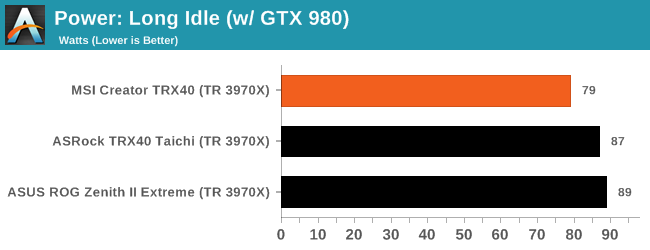
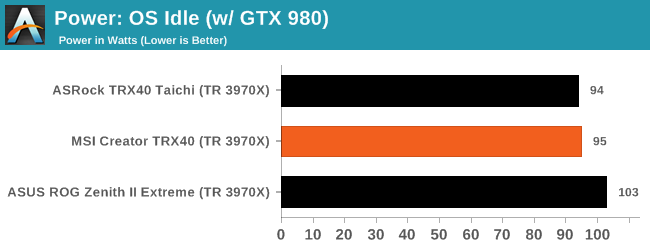
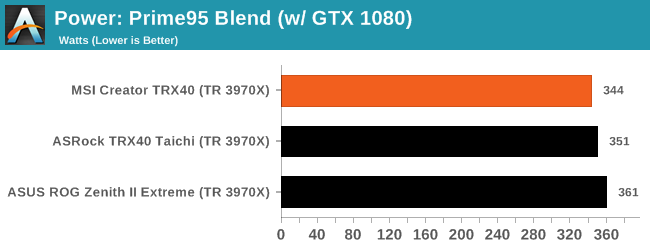
The MSI Creator TRX40 not only delivers solid figures in both long idle and idle power states, but it also performs efficiently in our load testing with a reading which peaked at the wall of 344 W.
Non-UEFI POST Time
Different motherboards have different POST sequences before an operating system is initialized. A lot of this is dependent on the board itself, and POST boot time is determined by the controllers on board (and the sequence of how those extras are organized). As part of our testing, we look at the POST Boot Time using a stopwatch. This is the time from pressing the ON button on the computer to when Windows starts loading. (We discount Windows loading as it is highly variable given Windows specific features.)
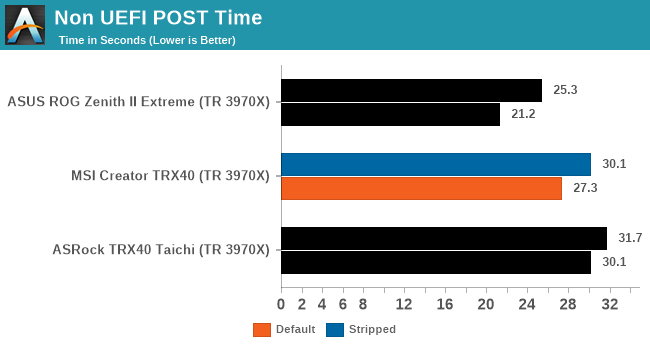
In our non-UEFI POST time test, the MSI Creator TRX40 performed with will a POST of 30.1 seconds at default settings, and 27.3 seconds with all the non-vital controllers disabled. This puts it quicker than ASRock's TRX40 Taichi by just under a second, but ASUS's ROG Zenith II Extreme is the current leader in our testing so far.
DPC Latency
Deferred Procedure Call latency is a way in which Windows handles interrupt servicing. In order to wait for a processor to acknowledge the request, the system will queue all interrupt requests by priority. Critical interrupts will be handled as soon as possible, whereas lesser priority requests such as audio will be further down the line. If the audio device requires data, it will have to wait until the request is processed before the buffer is filled.
If the device drivers of higher priority components in a system are poorly implemented, this can cause delays in request scheduling and process time. This can lead to an empty audio buffer and characteristic audible pauses, pops and clicks. The DPC latency checker measures how much time is taken processing DPCs from driver invocation. The lower the value will result in better audio transfer at smaller buffer sizes. Results are measured in microseconds.
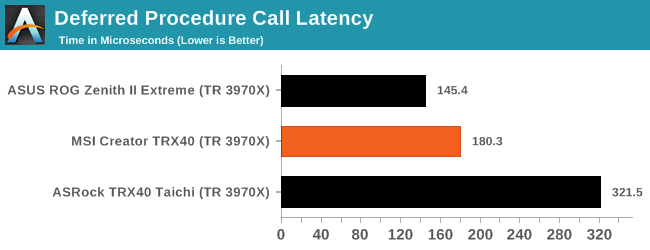
We test the DPC at the default settings straight from the box, and the MSI Creator TRX40 did well with a latency time of 180.3 us. This isn't as good as the ASUS ROG Zenith II Extreme, but both models are streets ahead of the ASRock TRX40 Taichi in terms of DPC Latency.










42 Comments
View All Comments
timecop1818 - Wednesday, February 26, 2020 - link
For when you spend nearly $4000 on a useless processor and have another $700 burning a hole in your pocket.Korguz - Wednesday, February 26, 2020 - link
yea ok intel shill, go to wccftech where you belongMikewind Dale - Wednesday, February 26, 2020 - link
Useless for you, maybe. But others may have a use.For example, I'm currently working on a multi-threaded statistical regression that takes 3 days to run on an 8-core Ryzen. I'd love to have 64 cores.
mrvco - Wednesday, February 26, 2020 - link
Useless in the 'my idea of gaming is running benchmarks at 1080p with dual RTX-2080 Ti GPUs' sense.bill.rookard - Wednesday, March 4, 2020 - link
Ouch! Yeah - having 8 times the physical cores would cut that down to... what? About 9-10 hours from 72 hours? I can see where you may need something like that. Imagine if you had 2P Epyc? You could run 2 sims in an 8 hour workday...nandnandnand - Wednesday, February 26, 2020 - link
Lol, I remember you from first post on the TR 3990X article:https://www.anandtech.com/show/15483/amd-threadrip...
You are useless and need a banning.
extide - Wednesday, February 26, 2020 - link
Imagine living a life so banal and boring that all you can do is get the first post on every AMD article and bash it.ingwe - Wednesday, February 26, 2020 - link
I would at least hope they are a paid shill. But who knows. Really wish they would ban them thoughrahvin - Thursday, February 27, 2020 - link
There's no reason to ban him. He's a shill, everyone knows it. He's had the gall to defend a $20K Intel processor with half the cores and trash talk the AMD processor that's both cheaper and more powerful in every regard in the same comment.You should remember, there's a pretty good chance he's a kid that feels like he bought into a "team" (or tribe) when he purchased his first Intel CPU and feels the need to defend that team at every point. It's human nature to try to show tribal loyalty, though you wish more people could see they are doing it and realize how dumb it is.
Irata - Friday, February 28, 2020 - link
Very well put.